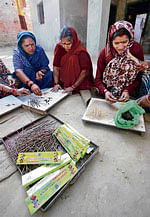Women turn waste into wealth

In most parts of the country, priests dispose of flowers offered to the deities in the temples. If the success story in a village nearby Lucknow is replicated in other parts of the country, the scene may undergo a change. The flowers are helping many families to remain gainfully employed and earn a few extra bucks.
Hundreds of Women near Lucknow have mastered the art of turning waste into useful material.
Flowers, an essential part of the worship in the temples, have been spreading their fragrance in the lives of the people by turning into a source of income thereby making them self-sufficient and helping them to lead a better life.
The womenfolk of Kathwara village, about 30 km from Lucknow, are using the flowers offered to the deity at the famous Chandrika Devi temple near their village to support their families.
The womenfolk from villages around the Chandrika Devi temple, have been manufacturing incense sticks from the flowers and sell them to smalltime retailers in the village markets and the shops selling ‘puja’ materials around different temples.
They collect the flowers which are offered to the deity and then thrown away. As the temple is quite famous, a huge quantity of flowers is offered to the deity every day. The quantity increases several folds during the ‘nav ratras’ and other festivals.
Earlier these flowers were thrown into the nearby Gomti river causing pollution, but now they have become a source of income.
They also collect flowers from ‘Devan Sharif’ (the tomb of the famous Sufi saint Syed Haji Waris Ali Shah. A large number devotees, including Hindus and Muslims, throng the ‘mazar’ (tomb) at Deva Sharif regularly and offer ‘chadars’ and flowers.
Each of the women makes enough incense sticks to earn close to Rs 50 every day.
“Sometimes it is even more...it depends on the number of the sticks manufactured and the demand, which picks up during festivals”, says Sushila.
These women learnt the art of converting the flowers into incense sticks from the scientists of the Central Institute of Medicinal an Aromatic Plants (CIMAP), a prestigious CSIR laboratory.
The flowers are dried under the sun and then crushed to turn them into a paste. A little quantity of wood powder is mixed with the paste. Coal powder is used as a coating on the sticks. A fragrant oil is also used. “Some wholesalers also buy the paste of the flowers”, Sushila added cheerfully.
The incense sticks manufactured in this way entail minimum production cost and are pure and without any chemicals and as a result are not harmful to human beings, the scientists say.
The women are thankful to the scientists of the CIMAP and the ‘pujari’ (priest) of the temple. “Without their support, we could not have done anything”, said Ruby.
“There is no dearth of the raw material”, said Rajni, another woman of the group.
The temple officials also are all praise for the womenfolk. “It is better to put the offered flowers to some use rather than throwing them in the Gomti and polluting the river further”, they said.
The womenfolk of these villages are happy to support their families by this part time job. “It (making incense sticks) does not affect our daily chores...we do it along with our daily responsibilities”, said Kiran Devi, a resident of Kathwara.
Several temples are situated along the Gomti river in Lucknow. A few among them are very famous and ancient and a huge quantity of flowers is offered there. These flowers ultimately make their way into the river.
The environmentalists have repeatedly sought a ban on the temples throwing flowers into the river but nothing concrete has emerged so far. The priests of the famous Mankameshwar Temple in Lucknow have also decided not to throw the flowers into the river.